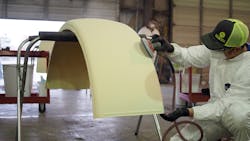Everyone knows we are facing all kinds of labor shortages in the transportation industry. Yes, it’s drivers and diesel technicians for trucks. But, it extends to computer specialists, communications-savvy people, electrical specialists, and brake system diagnosticians.
It goes even further to people that can review ELD files and recorded video files for safety purposes. Transportation needs fork lift operators and logistics specialists. To keep people and freight moving in all forms of transportation is going to be a challenge in the future. If you think it’s tough now, try to imagine what we will need for those electric wheel-end motors and big battery packs with power management systems that are fueled by hydrogen or plug into high power chargers.
Think about the future challenge. Today, reports indicate cars are parked 95% of the time. With the auto companies all investing in ride share efforts, they are realizing something akin to what they realized 25 years ago. 25 years ago the auto companies realized the profits are not in building cars, but in leasing and financing those vehicles.
Tomorrow, the money is in moving those vehicles with ride-share. Auto companies will be the owners of the vehicles, rather than individuals. The passenger car business is about to learn the importance of TLC. No, not “tender loving care.” At least – not sort of. They will be learning about total lifetime cost. Those vehicles will need to be running 95% of the time rather than being parked 95% of the time.
That means they will learn what we in trucking already know. TCO, total cost of operation, means you need to fix those vehicles quickly. And, that means the competition for talent to manage keeping vehicles running is going to get tougher.
We’re going to need a new model of training to reach a much larger number of people. The current model of sending people to a two-year vocational school is not working. Wyotech is closing campuses. I suspect other vocational schools may be having problems. The future is likely to involve much more focused training. You don’t need two years of generalized and “old” training to repair the latest autonomous vehicle and advanced driver-assistance systems.
The future will involve a lot more technology for training. Why not have virtual reality training using game boxes at homes to start the process? Then where necessary, do physical testing in a short period of time of days or weeks.
Why not put together a series of Tier 1 training programs as an accreditation rather than a two-year vocational training curriculum? I’d think companies such as Bendix, WABCO, Allison, Cummins, ThermoKing and others would be interested in getting people trained to fix their stuff fast and efficiently. I could imagine a transportation technologist with logos on his/her personal website indicating which of the many such programs they have completed and been certified by the manufacturer.
Business models are changing all around us. Let’s create new service training for the future. Let’s start STRAINING for the new ServiceTRAINING.
About the Author
Paul Menig
CEO
Paul Menig is the CEO of Business Accelerants, a consulting company focused on helping companies succeed by leveraging technology in their products and processes.
